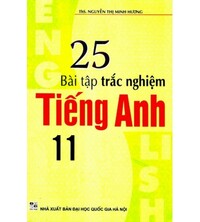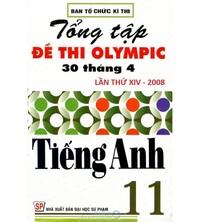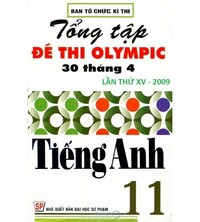Tiếng Anh 11 Grammar Builder – Unit 1
1 Complete the sentences. Use the past simple or the past continuous form of the verbs in brackets. 2 Complete the sentences. Use the past simple or the past perfect form of the verbs in brackets. 3 Choose the best ending (a or b) for the sentences.
Bài 1
1.1 Past tense contrast
(Tương phản thì quá khứ)
We use past tenses to talk about past events. We use the past continuous to describe a scene in the past. The events were in progress at the same time.
The sun was shining. A man was standing at the bus stop waiting for a bus.
We use the past simple for actions or events that happened one after the other.
Tom got up, had a shower and got dressed.
We use the past continuous to describe a longer background event, and the past simple to describe an action or event that interrupted it.
The phone rang while we were having dinner.
We use the past perfect to talk about an event that happened before another event in the past.
I didn't have any money because I'd lost my wallet.
Notice that with regular verbs the past simple and the past participle form of the past perfect are the same.
She arrived yesterday night.
She had arrived before we served the dinner.
However, with irregular verbs the past simple and the past participle form of the past perfect are often different.
I ate an apple.
I'd already eaten.
Tạm dịch
Chúng ta sử dụng thì quá khứ để nói về các sự kiện trong quá khứ. Chúng ta dùng thì quá khứ tiếp diễn để diễn tả một cảnh trong quá khứ. Các sự kiện đã được tiến hành cùng một lúc.
Mặt trời đang tỏa nắng. Một người đàn ông đang đứng ở trạm xe buýt chờ xe buýt.
Chúng ta sử dụng thì quá khứ đơn cho các hành động hoặc sự kiện xảy ra lần lượt.
Tom thức dậy, đi tắm và mặc quần áo.
Chúng ta sử dụng thì quá khứ tiếp diễn để mô tả một sự kiện nền dài hơn và thì quá khứ đơn để mô tả một hành động hoặc sự kiện đã làm gián đoạn nó.
Điện thoại reo khi chúng tôi đang ăn tối.
Chúng ta dùng thì quá khứ hoàn thành để nói về một sự kiện xảy ra trước một sự kiện khác trong quá khứ.
Tôi không có tiền vì tôi bị mất ví.
Lưu ý rằng với các động từ thông thường thì quá khứ đơn và dạng quá khứ phân từ của quá khứ hoàn thành giống nhau.
Cô ấy đến vào tối hôm qua.
Cô ấy đã đến trước khi chúng tôi phục vụ bữa tối.
Tuy nhiên, với các động từ bất quy tắc thì quá khứ đơn và dạng quá khứ phân từ của quá khứ hoàn thành thường khác nhau.
Tôi đã ăn một quả táo.
Tôi đã ăn rồi.
1 Complete the sentences. Use the past simple or the past continuous form of the verbs in brackets.
(Hoàn thành các câu. Sử dụng dạng quá khứ đơn hoặc quá khứ tiếp diễn của động từ trong ngoặc.)
1 I __________ (have) a crash while I__________ (learn) to drive.
2 Sam __________(get) his first job while he__________ (live) in London.
3 It __________ (rain), so we __________(decide) to cancel the barbecue.
4 What __________you __________ (do) when I (see) you in town?
5 Emma __________ (not hear) the phone ringing because she __________ (listen) to music in her bedroom.
6 Ryan __________ (break) his arm while he _________ (ski) in France.
7 Harry __________ (work) as a chef when he __________ (meet) Sally.
8 You obviously __________ (not listen) when I __________ (ask) you to turn down the music.
Phương pháp giải:
*Nghĩa của từ vựng
have – had (v): có
learn – learned (v): học
get – got (v): lấy
live – lived (v): sống
rain – rained (v): mưa
decide – decided (v): quyết định
do – did (v): làm
hear – heard (v) nghe
listen – listened (v): nghe
break – broke (v): gãy
ski - skied (v): trượt tuyết
work – worked (v): làm việc
meet – met (v): gặp
ask – asked (v): yêu cầu
Cấu trúc thì quá khứ đơn: S + V2/ed.
Cấu trúc thì quá khứ tiếp diễn: S + was / were + V-ing
Lời giải chi tiết:

1 I had (have) a crash while I was learning (learn) to drive.
(Tôi bị tai nạn khi đang học lái xe.)
2 Sam got (get) his first job while he was living (live) in London.
(Sam có công việc đầu tiên khi anh ấy đang sống ở London.)
3 It rained (rain), so we decided (decide) to cancel the barbecue.
(Trời mưa nên chúng tôi quyết định hủy tiệc nướng.)
4 What were you doing (do) when I saw (see) you in town?
(Bạn đang làm gì khi tôi thấy bạn trong thị trấn?)
5 Emma didn't hear (not hear) the phone ringing because she was listening (listen) to music in her bedroom.
(Emma không nghe thấy tiếng chuông điện thoại vì cô ấy đang nghe nhạc trong phòng ngủ.)
6 Ryan broke (break) his arm while he was skiing (ski) in France.
(Ryan bị gãy tay khi đang trượt tuyết ở Pháp.)
7 Harry was working (work) as a chef when he met (meet) Sally.
(Harry đang làm đầu bếp thì gặp Sally.)
8 You obviously didn't listen (not listen) when I asked (ask) you to turn down the music.
(Rõ ràng là bạn đã không nghe khi tôi yêu cầu bạn vặn nhỏ nhạc.)
Bài 2
2 Complete the sentences. Use the past simple or the past perfect form of the verbs in brackets.
(Hoàn thành các câu. Sử dụng dạng quá khứ đơn hoặc quá khứ hoàn thành của động từ trong ngoặc.)
1 My uncle and aunt _________ (already/get engaged) before they _________(emigrate) to Australia.
2 I _________(not/can) buy anything because I _________(forget) my wallet.
3 Robert _________(be) upset because he _________ (split up) with his girlfriend.
4 Kelly _________(start) her first business before she_________(leave) university.
5 As soon as Sara _________(inherit) the money from her grandmother, she _________(buy) a car.
6 By the time Joe _________(retire), he_________(become) a grandfather.
7 After Fred _________ (settle down) in London, he _________(decide) to have a change of career.
8 We _________ (spend) the weekend moving house, so we _________ (go) to bed very early on Sunday.
Phương pháp giải:
*Nghĩa của từ vựng
get – got – got (v): lấy
emigrate – emigrated – emigrated (v): di cư
can – could: có thể
forget – forgot – forgotten (v): quên
be – was / were – been: thì, là, ở
split – split – split (v): chia
start – started – started (v): bắt đầu
leave – left – left (v): rời khỏi
inherit – inherited – inherited (v): thừa hưởng
buy – bought – bought (v): mua
retire – retired – retired (v): về hưu
become – became – become (v): trở thành
settle – settled – settled (v): định cư
decide – decided – decided (v): quyết định
spend – spent – spent (v): dành ra
go – went – gone (v): đi
Cấu trúc thì quá khứ đơn: S + V2/ed.
Cấu trúc thì quá khứ hoàn thành: S + had + V3/ed
Lời giải chi tiết:

1 My uncle and aunt had already got engaged (already/get engaged) before they emigrated (emigrate) to Australia.
(Chú và dì của tôi đã đính hôn trước khi họ di cư sang Úc.)
2 I couldn't (not/can) buy anything because I had forgotten (forget) my wallet.
(Tôi không thể mua bất cứ thứ gì vì tôi đã quên ví của mình.)
3 Robert was (be) upset because he had split up (split up) with his girlfriend.
(Robert rất buồn vì anh ấy đã chia tay bạn gái.)
4 Kelly had started (start) her first business before she left (leave) university.
(Kelly bắt đầu công việc kinh doanh đầu tiên trước khi rời trường đại học.)
5 As soon as Sara inherited (inherit) the money from her grandmother, she bought (buy) a car.
(Ngay sau khi Sara được thừa hưởng số tiền từ bà ngoại, cô ấy đã mua một chiếc ô tô.)
6 By the time Joe retired (retire), he had become (become) a grandfather.
(Vào thời điểm Joe nghỉ hưu, anh ấy đã trở thành ông ngoại.)
7 After Fred had settled down (settle down) in London, he decided (decide) to have a change of career.
(Sau khi Fred ổn định cuộc sống ở London, anh ấy quyết định thay đổi nghề nghiệp.)
8 We spent (spend) the weekend moving house, so we went (go) to bed very early on Sunday.
(Chúng tôi dành cả ngày cuối tuần để chuyển nhà, vì vậy chúng tôi đi ngủ rất sớm vào Chủ nhật.)
Bài 3
3 Choose the best ending (a or b) for the sentences.
(Chọn phần kết thúc tốt nhất (a hoặc b) cho các câu.)
1 We couldn't open the front door because
a it had snowed all night.
b it snowed all night.
2 It was a lovely spring day and the birds
a sang.
b were singing.
3 I looked out of the window and noticed that
a it had stopped raining.
b it was stopping raining.
4 The plants died because we
a were forgetting to water them.
b forgot to water them.
5 Before I left the house, I
a locked all the windows.
b was locking all the windows.
6 I wasn't particularly hungry because
a I'd already had lunch.
b I already had lunch.
Phương pháp giải:
Thì quá khứ đơn diễn tả một việc đã xảy ra và kết thúc trong quá khứ => cấu trúc: S + V2/ed
Thì quá khứ hoàn thành diễn tả một hành động xảy ra trước một hành động khác trong quá khứ => cấu trúc: S + had + V3/ed
Lời giải chi tiết:

1 We couldn't open the front door because it had snowed all night.
(Chúng tôi không thể mở cửa trước vì tuyết rơi suốt đêm.)
2 It was a lovely spring day and the birds were singing.
(Đó là một ngày mùa xuân đẹp trời và những chú chim đang ca hát.)
3 I looked out of the window and noticed that it had stopped raining.
(Tôi nhìn ra ngoài cửa sổ và nhận thấy trời đã tạnh mưa.)
4 The plants died because we forgot to water them.
(Cây cối chết vì chúng tôi quên tưới nước.)
5 Before I left the house, I locked all the windows.
(Trước khi tôi rời khỏi nhà, tôi đã khóa tất cả các cửa sổ.)
6 I wasn't particularly hungry because I'd already had lunch.
(ôi không đói lắm vì tôi đã ăn trưa rồi.)
Bài 1
1.2 used to
(đã từng)
We use used to plus the infinitive without to to describe past situations or habits that are different now.
I used to go ice skating. (I don't go now.)
She didn't use to be confident. (She's confident now.)
|
Affirmative |
Negative |
Interrogative |
|
We used to live in the city. |
We didn't use to go hiking. |
Did you use to live near the sea? |
Tạm dịch
Chúng ta dùng used to cộng với động từ nguyên thể không to để diễn tả những tình huống hoặc thói quen trong quá khứ khác với bây giờ.
Tôi đã từng đi trượt băng. (Tôi không đi bây giờ.)
Cô không quen tự tin. (Bây giờ cô ấy tự tin.)

1 Complete the dialogue with the correct form of used to and the verbs in brackets.
(Hoàn thành đoạn hội thoại với dạng đúng của used to và động từ trong ngoặc.)
Maria: Let me see that photo. Hey, you 1_________ (have) long hair! I didn't know that.
Sam: I know. I was about fourteen then. I 2_________ (be) a fan of heavy metal.
Maria: My brother 3_________ (like) heavy metal. He often went to concerts with friends. But he 4_________ (not invite) me.
Sam: I 5_________ (not go) to concerts. The tickets were too expensive. But I 6_________ (listen) to CDs a lot. What about you? What kind of music 7_________ (you / listen) to when you were younger?
Maria: I 8_________ (enjoy) listening to pop music and dancing with my friends.
Sam: 9_________ (you / go) to discos?
Maria: Not really. We were too young. But my dad 10_________ (take) me to pop concerts sometimes. I loved those.
Phương pháp giải:
Cấu trúc “used to” ở dạng khẳng định: S + used to + Vo (nguyên thể)
Cấu trúc “used to” ở dạng phủ định: S + didn’t + use to + Vo (nguyên thể)
Cấu trúc “used to” ở dạng nghi vấn: Did + S + use to + Vo (nguyên thể)
Lời giải chi tiết:

Bài hoàn chỉnh
Maria: Let me see that photo. Hey, you 1 used to have (have) long hair! I didn't know that.
Sam: I know. I was about fourteen then. I 2 used to be (be) a fan of heavy metal.
Maria: My brother 3 used to like (like) heavy metal. He often went to concerts with friends. But he 4 didn’t use to invite (not invite) me.
Sam: I 5 didn’t use to go (not go) to concerts. The tickets were too expensive. But I 6 used to listen (listen) to CDs a lot. What about you? What kind of music 7 did you use to listen (you / listen) to when you were younger?
Maria: I 8 used to enjoy (enjoy) listening to pop music and dancing with my friends.
Sam: 9 Did you use to go (you / go) to discos?
Maria: Not really. We were too young. But my dad 10 used to take (take) me to pop concerts sometimes. I loved those.
Tạm dịch
Maria: Cho tôi xem bức ảnh đó. Này, bạn đã từng có tóc dài! Tôi không biết điều đó.
Sam: Tôi có. Lúc đó tôi khoảng mười bốn tuổi. Tôi đã từng là một fan của heavy metal.
Maria: Anh của tôi từng thích heavy metal. Anh ấy thường đi xem hòa nhạc với bạn bè. Nhưng anh ấy đã từng không mời tôi.
Sam: Tôi đã từng không đi đến các buổi hòa nhạc. Vé quá đắt. Nhưng tôi đã từng nghe đĩa CD rất nhiều. Còn bạn thì sao? Loại nhạc nào bạn đã nghe khi bạn còn nhỏ?
Maria: Tôi đã từng thích nghe nhạc pop và khiêu vũ với bạn bè.
Sam: Bạn đã từng đi đến vũ trường chưa?
Maria: Không hẳn. Chúng tôi còn quá trẻ. Nhưng đôi khi bố tôi đã từng thường đưa tôi đến các buổi hòa nhạc pop. Tôi yêu những thứ đó.
Bài 2
2 Complete the sentences with used to / didn't use to and the verbs below.
(Hoàn thành các câu với used to / didn't used to và các động từ bên dưới.)

1 They _________ in Canada. Then they moved to the USA.
2 You can buy a laptop quite cheaply now. They _________ a lot more.
3 I _________ the guitar. I started learning it last month.
4 That shop _________ computers. It was a bookshop.
5 My sister _________ skiing every winter, but now she prefers snowboarding.
6 I _________ milk with every meal, but now I always have water.
7 My dad _________ dinner every evening, but now my sister and I usually do it.
8 I really enjoyed chess when I was younger, but I _________very often.
Phương pháp giải:
- Cấu trúc với “used to” (đã từng)
S + used to + Vo (nguyên thể)
S + didn’t use to + Vo (nguyên thể)
*Nghĩa của các động từ
cook (v): nấu ăn
cost (v): tốn
drink (v): uống
go (v): đi
live (v): sống
play (v): chơi
sell (v): bán
win (v): thắng
Lời giải chi tiết:

1. They used to live in Canada. Then they moved to the USA.
(Họ đã từng sống ở Canada. Sau đó, họ chuyển đến Hoa Kỳ.)
2. You can buy a laptop quite cheaply now. They used to cost a lot more.
(Bây giờ bạn có thể mua một chiếc máy tính xách tay khá rẻ. Chúng đã từng tốn nhiều hơn rất nhiều.)
3. I didn't use to play the guitar. I started learning it last month.
(Tôi đã từng không chơi guitar. Tôi bắt đầu học nó từ tháng trước.)
4. That shop didn't use to sell computers. It was a bookshop.
(Cửa hàng đó đã từng không bán máy tính. Nó là một hiệu sách.)
5. My sister used to ski every winter, but now she prefers snowboarding.
(Chị tôi đã từng trượt tuyết vào mỗi mùa đông, nhưng bây giờ chị ấy thích trượt ván tuyết hơn.)
6. I used to drink milk with every meal, but now I always have water.
(Tôi đã từng uống sữa trong mỗi bữa ăn, nhưng bây giờ tôi luôn uống nước.)
7. My dad used to cook dinner every evening, but now my sister and I usually do it.
(Bố tôi đã từng nấu bữa tối mỗi tối, nhưng bây giờ chị tôi và tôi thường làm việc đó.)
8. I really enjoyed chess when I was younger, but I didn't use to play it very often.
(Tôi thực sự thích cờ vua khi tôi còn nhỏ, nhưng tôi đã từng không chơi nó thường xuyên.)
Search google: "từ khóa + timdapan.com" Ví dụ: "Tiếng Anh 11 Grammar Builder – Unit 1 timdapan.com"







